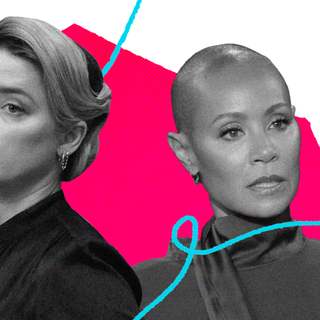
Ricky Gervais’ Special Shows How Edginess in Comedy Becomes a Front for Bigotry
Transphobic jokes have emerged as a litmus test for what is acceptable comedy, dehumanizing a community in the process.

Ricky Gervais’ Netflix special ‘Super Nature‘ starts with a treatise on irony. Gervais coaches the audience on when to laugh, pre-emptively running roughshod over woke critics who probably won’t get it. Then, for some reason, he launches into a tirade about trans women.
“Her penis you fucking bigot!” he says, correcting imaginary “old–fashioned women, the ones with wombs,” who are supposedly expressing a gender panic. The punchline isn’t the “old-fashioned” woman, however — because the joke is about the woke police. “What if she rapes you? You fucking TERF whore!”
Amid all this, the audience cheers and applauds. Gervais then breaks to sermonize about responding to jokes. “You can’t say that joke was offensive, you have to say you found it offensive… Feelings are personal,” he says. In other words, Gervais means that you can’t cut yourself up on the edginess. The edge is the provocative, revolutionary, offensive form of art that elevates the human race. Except, there’s nothing edgy in a man fully aware of his own privilege joking about someone else’s lack of it. It’s not just crude — it serves as a perfect ploy for disguising an unwillingness to grow out of your own beliefs. It never was edgy, it just was bigoted.
Playing to the lowest common denominator of humor and blaming people who get hurt by saying it’s their “personal problem” is a frequent device employed by privileged comedians. “If you don’t like it don’t watch,” they retort — not acknowledging that turning off the show simply makes the person oblivious to their own personhood being the punchline. The philosophy of this humor is: you aren’t in on the joke, you are the joke.
Related on The Swaddle:
Joke or Sexism? Misogynist Humor Condones Prejudice
The special meanders thus, not finding a foothold for the humor — and so, it falls back into the familiar anti-cancel culture set. It only goes to show that for someone who has everything going right for themselves, the idea of a big looming threat is other people calling them out for their behavior. There is something especially grating about someone without the experience of anti-trans violence making light of it in front of thousands of people — it isn’t just “offensive,” it’s dehumanizing.
But the other thing about making jokes at the expense of others is something far worse as far as the comedians themselves are concerned: it’s boring. There is nothing more worthy of an eye-roll than a self-admitted “white heterosexual multimillionaire” telling jokes about others while claiming to stand for their rights “in real life.”
The marginalized people they’re mocking, on the other hand, face far more real threats — that don’t just extend to their social standing, but to their lives, liberties, and mental health, to name a few — on an everyday basis. And these “jokes” only serve to worsen those threats by ensuring an already ostracized population is disparaged further.
“By disguising expressions of prejudice in a cloak of fun and frivolity, disparagement humor, like the jokes above, appears harmless and trivial. However, a large and growing body of psychology research suggests just the opposite – that disparagement humor can foster discrimination against targeted groups,” writes one psychologist, on a phenomenon called “disparagement humor.”
The biggest undoing of privileged male comedians who joke about their eroding right to humiliate others is that it is plain boring, uninventive, and lacklusture. There is nothing sparkling about a wit that doesn’t look inward or up, but instead points to another’s misery. It’s simply not funny when jokes about an experience, somebody’s personhood, are told by someone with no conceivable knowledge of it. The real offence, then, is humor that is boring.
Related on The Swaddle:
Will Smith’s Oscar ‘Smack’ Forces Us to Re‑examine the Kind of Humor We Find Acceptable
“Woke comedy… I’d rather watch Louis C.K masturbate,” he says, to groans and shocked laughter. Then, he begins to wax eloquent about what he would do for a joke. He will be, do, and say anything, in service of “whatever makes the joke funnier” — and for a loud and proud atheist, Gervais is almost reverential to the idea of a pre-existing joke, an entity that he supplicates before, paying no mind to anyone else. The Joke — it is the unquestionable god, and Gervais follows its scripture dogmatically.
Where, then, is the room for creativity? In insisting that this is the type of humor that is real, in refusing to adapt or introspect, in lashing out at the woke mob, while heterosexual male comedians are admitting a fatal flaw in their personas — that they lack the imagination for being really, truly, funny. It is not others who aren’t willing to be challenged, it’s themselves who refuse to be.
There is something especially cynical, moreover, in a brand of humor that refuses to engage meaningfully with changing times and instead likes to laugh at it. It signals a reactionary tendency within comedy itself — one that harkens back to the “good old days” while responding to a shifting culture and stubbornly making the same jokes over and over again.
It ultimately confuses getting a rise out of people with getting a laugh, and in doing so, it follows the same playbook as schoolyard bullies who laugh at their own ability to hurt someone else.
Rohitha Naraharisetty is a Senior Associate Editor at The Swaddle. She writes about the intersection of gender, caste, social movements, and pop culture. She can be found on Instagram at @rohitha_97 or on Twitter at @romimacaronii.
Related


The Internet Wants to Talk About ‘Toxic Femininity,’ but Gets It All Wrong
